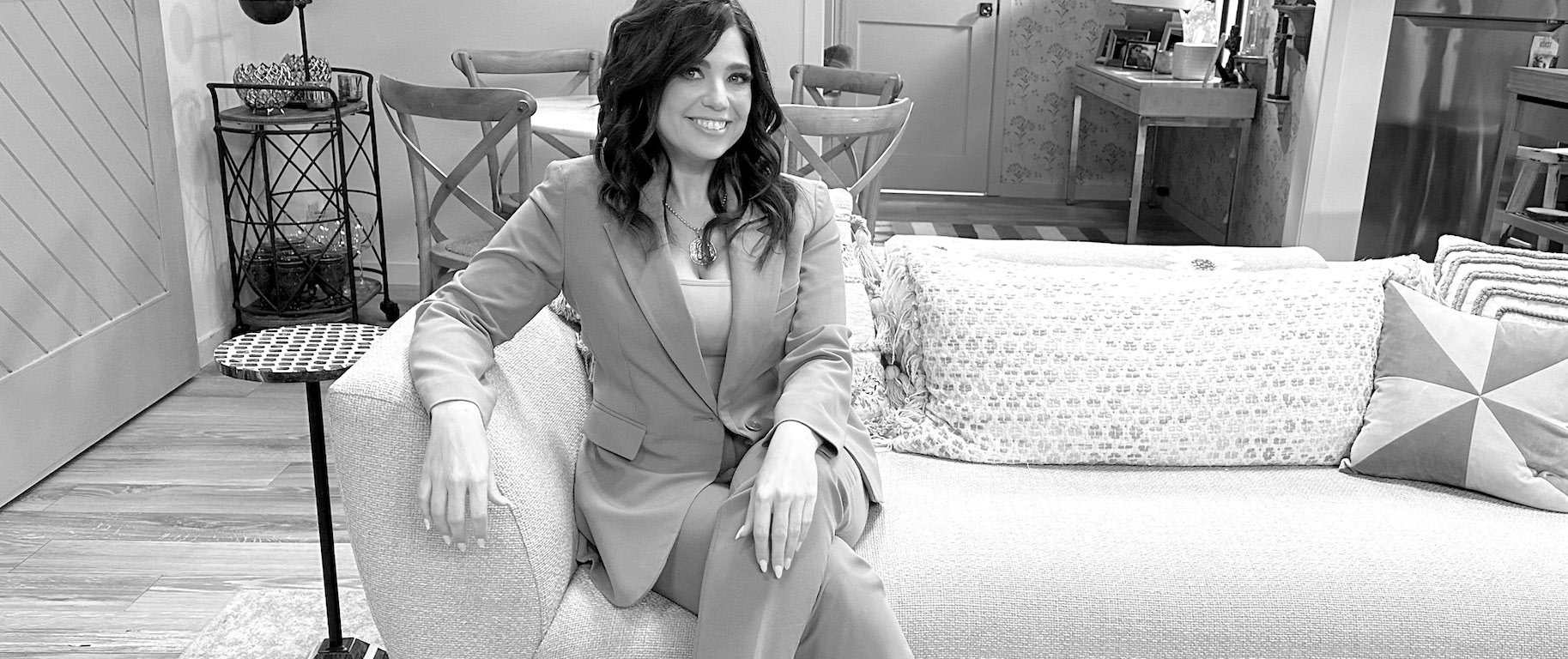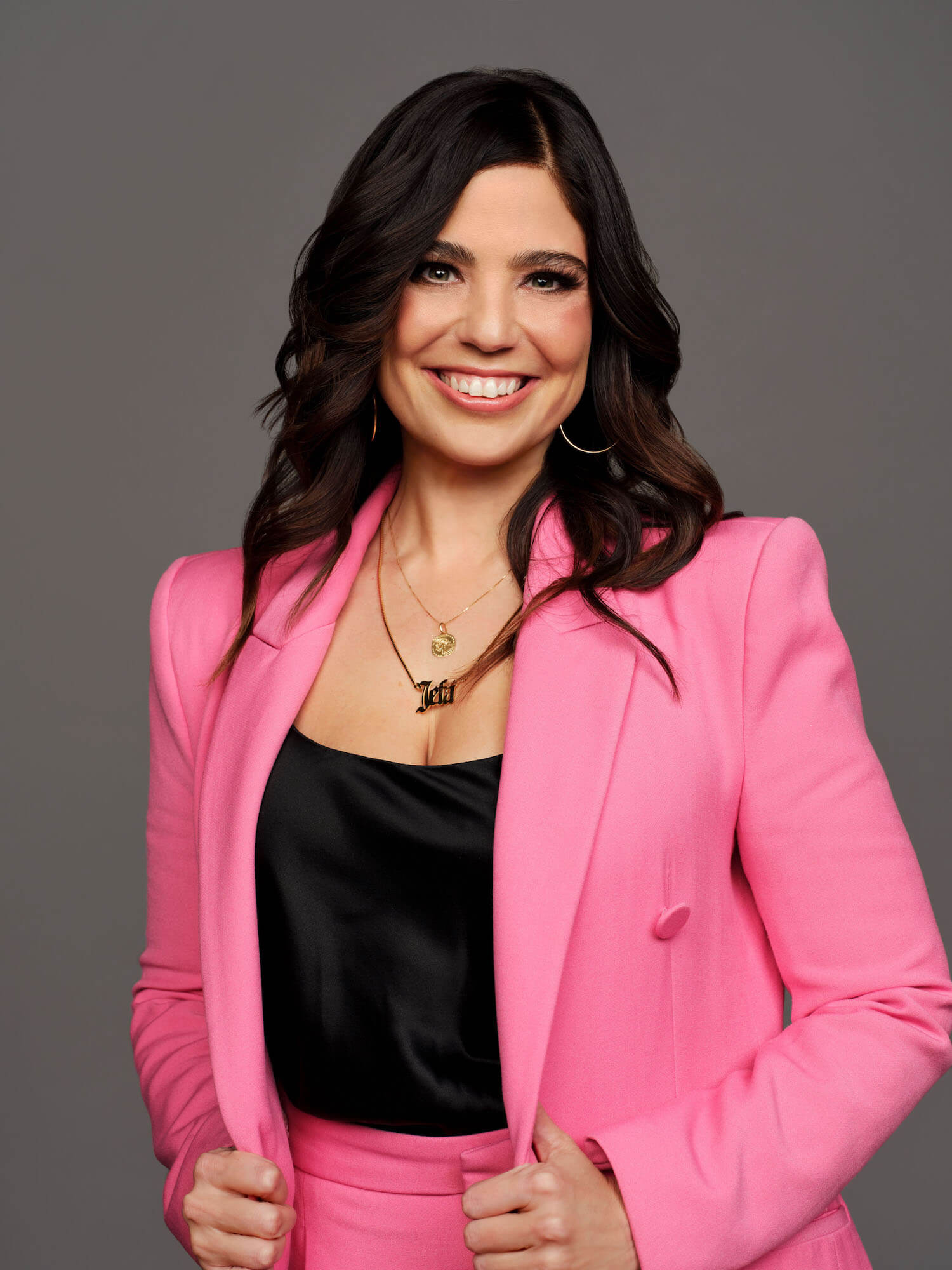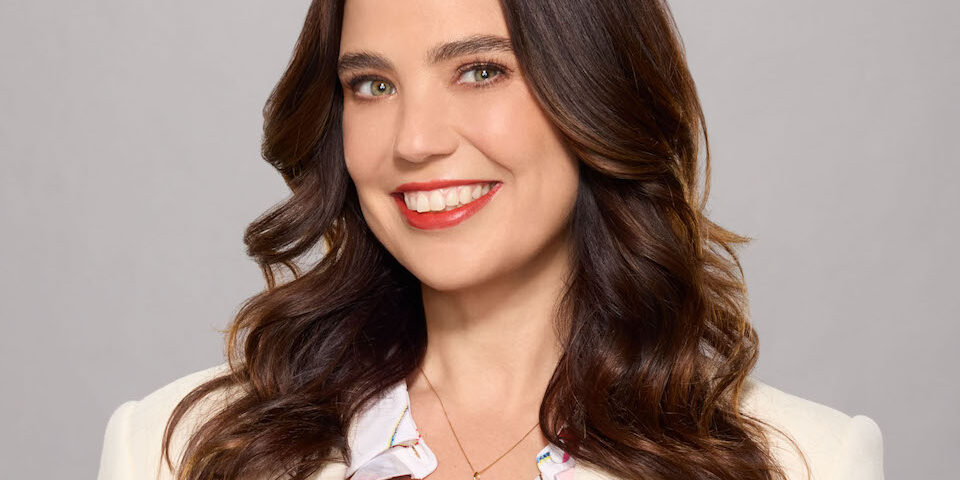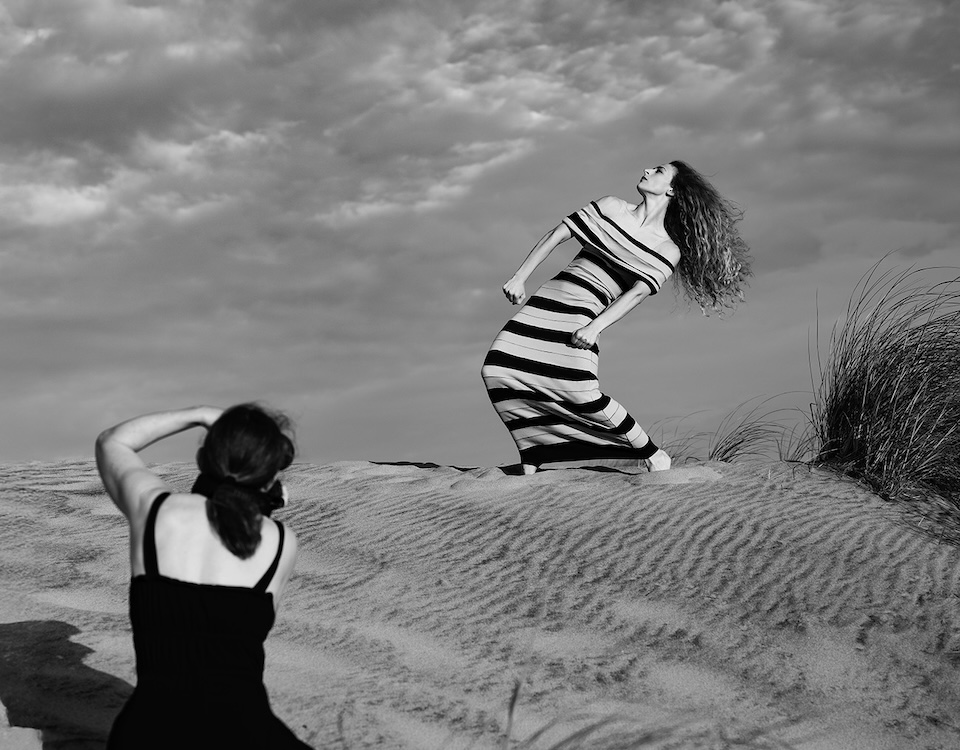
DEBBY WOLFE’S JOURNEY OF LAUGHTER, LOVE, AND REPRESENTATION IN COMEDY

BY EBBY MAGAZINE
Discover the Inspirational Story Behind Debby Wolfe's Mission to Elevate Latinx Narratives and Break Barriers in Television Comedy.

“TO ME, COMEDY IS HEALING. AND IT’S VERY HUMAN IN THE MOMENTS WHERE WE’RE HURTING THE MOST, TO FIND A WAY TO MAKE FUN OF IT AND LAUGH SO THAT IT HURTS A LITTLE LESS.”
DEBBY WOLFE IS THE SHOWRUNNER, CO-CREATOR AND EXECUTIVE PRODUCER OF THE HIT NBC SITCOM
LOPEZ VS. LOPEZ

In the vibrant tapestry of Hollywood, where stories often reflect the multifaceted essence of our identities, one voice stands out for its unwavering commitment to authenticity and inclusivity. Meet Debby Wolfe, the creative force behind the acclaimed NBC comedy “Lopez vs. Lopez,” whose journey from Miami to the heart of television’s most diverse narratives is as inspiring as it is groundbreaking.
Debby Wolfe, a showrunner, co-creator, and executive producer, brings a unique perspective to her work, infusing each episode with the rich complexities of her multicultural upbringing. Born to a Salvadoran immigrant mother and a Jewish father in Hollywood, Florida, Wolfe’s quest for belonging led her to the written word, where storytelling became her compass in navigating the intersections of her identity.
Wolfe’s dedication to elevating Latine voices has been unwavering from her early days in the industry to her current role at the helm of network television. Through her work on “Lopez vs. Lopez” and many other projects, she has carved out a space where authenticity reigns supreme, challenging stereotypes and amplifying the narratives that resonate with audiences worldwide.
Join us as we delve into Debby Wolfe’s remarkable journey, celebrating the laughter, the challenges, and the triumphs that have shaped her path in the entertainment landscape. In honoring her achievements, we also recognize her commitment to paving the way for future generations of storytellers, ensuring that every voice can be heard and cherished.
“I THINK OUR INDUSTRY FAILS TO RECOGNIZE THAT LATINE PEOPLE ARE NOT A MONOLITH. WE COME FROM A MYRIAD OF DIFFERENT COUNTRIES; WE SPEAK SPANISH IN DIFFERENT WAYS, AND EACH OF OUR INDIVIDUAL CULTURES HAVE UNIQUE VALUES AND TRADITIONS.”
In your journey as a writer and producer, how has your multicultural background influenced the stories you tell?
As the daughter of a Salvadorian immigrant mother and a Jewish father from Miami, I’m like a pupusa filled with pastrami. I’ve got a fire and passion for life that exacerbate my Jewish stomach. One side of my family was scientists and lawyers; the other side was valets and babysitters, and I didn’t feel I fit in with either one. I feel it was definitely this identity crisis and wanting to make sense of it that really led me to become a storyteller.
Can you share your perspective on the importance of advocating for Latinx representation in the entertainment industry, both in front of and behind the camera?
It’s disheartening to see so many shows, especially Latine shows, not get the chance to build and develop. I’m incredibly grateful that audiences are responding to Lopez vs. Lopez and that our network is standing behind our efforts and our messaging.
To have this continued support solidifies the idea that we’re telling stories and portraying a Latine family in a way that resonates with our viewers. Our industry is going through growing pains, but even so, Latine people have been largely underrepresented.
In an effort to change that, I prioritize training my writers to be future showrunners. I involve them in all aspects of the process, from pre-production, costumes, props, and editing all the way through the final sound mix. I encourage them to apply for writer training programs such as NBC Writers on the Verge, where I got my start. Recently, my assistant, Jaleese Ramos, was accepted into the Disney Writers Program. I want my writers to be undeniable forces when they go out and pitch their own diverse shows and further the representation of Latines on screen.
We have also had aspiring latine female directors shadow our in-house directors; we have a super talented latine crew behind the scenes, such as our production designer Claudia Roque, script coordinator Rebecca Ancheta-Blum, assistant production coordinator Dened Rey Moreno, costumers Tina Zepeda and Tiffany Powers, our grip, David Rivas who I hope will all continue to rise up in their professional careers and give back by opening the doors for others.
“Lopez vs. Lopez” has been celebrated for its authentic representation of the Latinx community. Could you share some insights into the process of crafting these authentic narratives?
I think our industry fails to recognize that Latine people are not a monolith. We come from a myriad of different countries; we speak Spanish in different ways, and each of our individual cultures have unique values and traditions. That’s not to say that our communities don’t have similarities, but too often, our industry portrays Latine people as non-specific caricatures. It’s of utmost importance to me that our show looks and feels authentic.
We talk about the specifics of the predominantly Latine neighborhood in LA that our family lives in, Glassell Park, which is the same neighborhood I live in. We make sure viewers feel represented by the themes, the cultural nuances, and the differences between the Mexicans, Cubans, Dominicans, and Salvadorans who are represented in the show, and we’re able to do that accurately because we have writers and talent who represent those cultures working for us.
The show tackles various topics, from identity crises to mental health issues, with humor and heart. How do you balance addressing serious themes with maintaining a comedic tone?
To me, comedy is healing. And it’s very human in the moments where we’re hurting the most to find a way to make fun of it and laugh so that it hurts a little less. Latine and Jewish people, specifically, are two cultures that have been through so much oppression, strife, and trauma that we’ve had no choice but to become funny people. So, to me, it’s not really challenging to find levity in the challenging topics we explore because it’s what we do every day.
Diversity in the writers’ room is often credited with enriching storytelling. How does your team’s diverse background contribute to the authenticity of the show’s portrayal of family dynamics and cultural nuances?
This is a great question! While we often tell stories through a specific Latine lens, it’s really important to me that they are also universal stories. Having a diverse group of writers feels like having a constant support system and safety net, ensuring that, even though we all come from different backgrounds, we relate to the stories we tell on some level. All my writers have been really incredible with sharing their own personal experiences in the room, and it really enriches the authenticity of the show because, at the end of the day, it’s not just latine families that grapple with mental health, toxic masculinity, and alcoholism; it’s everyone, and my goal is that families from all backgrounds can see themselves in our characters.
“FOR ME, WRITING IS HEALING. YOU GET TO RELIVE DIFFICULT SITUATIONS AND FEELINGS THROUGH FICTIONAL CHARACTERS, AND AS YOU FIND THE COMEDY IN IT ALL, YOU END UP RELEASING THE PAIN. BREAKING A STORY IS LIKE HAVING A BREAKTHROUGH IN THERAPY. AND THEN YOUR AUDIENCE GETS TO EXPERIENCE THAT SAME RELEASE. ”
As a mentor figure in the industry, what advice do you have for aspiring Latinx writers and producers who are striving to break into television?
Buckle up and get ready for a ride because you definitely need a deep desire to work in TV and a strong belief in your talent; otherwise, you won’t survive. You’re gonna have to do a lot of low-level jobs that are awful, but trust in the journey that someone you meet at one of them will lead you to the next promotion and the next. Everyone’s journey in Hollywood is different, and there’s no formula for success other than to believe in yourself.
What role do organizations like NALIP play in promoting and advancing Latino content creators in the media?
The very first organization to believe in my talent was NALIP. I did a feature writers workshop with them very early in my career, where I was introduced to mentors such as Ligiah Villalobos, who advised me on how to pursue a career in television. As Latine creators, we don’t often see ourselves in leadership roles, so it’s important for us to meet and be mentored by those who have succeeded before us in order to truly believe we can do it too. Ultimately, we are stronger in numbers, and I think these organizations understand that.
What milestones has “Lopez vs. Lopez” achieved in representing authentic Latino stories on network television?
I want the legacy to be that not only did this show accurately represent mi gente, but that it opened up conversations in homes across America about mental health, trauma, and how to take steps towards growth and healing. Through writing these characters, I’ve done my own healing and my relationship with my parents has evolved and grown for the better. And recently, a fan told me the show inspired her to reconnect with her estranged father. That’s the power of this show; it’s so much more than just a fun half-hour of laughs; it’s inspiring more empathy and compassion into people’s lives.
Can you talk about your collaboration with George Lopez in creating and portraying the characters in the show?
George and Mayan have been incredibly generous with sharing so many personal stories from their own lives that inform our storytelling. It’s why so many people can relate to our show. The episodes come from an authentic place. The feedback I’ve been getting is that so many of our viewers can see themselves or someone from their lives in each of the characters on Lopez vs. Lopez. And that is only possible because of George and Mayan’s willingness to allow their lives to be mined for the show.
Some of what happens in the show may have never really happened in George and Mayan’s real life, but a lot of their life experiences at least seed our storytelling. And stories that are fictional, are still funneled through George and Mayan, who give their thoughts on how they believe the fictional characters would address issues in real life ways.
Stories told in every episode are peppered with experiences from George and Mayan’s real relationship, things they’ve overcome or are struggling with, and ways they have resolved issues. It’s the perfect marriage between creativity and reality to bring some of the best, funniest, and most culturally relevant storytelling to television today.
How does your journey, from participating in NBC’s “Writers on the Verge” program to becoming a showrunner and executive producer, reflect your commitment to Latinx representation in the industry?
The Writers on the Verge program was a writers boot camp where you had to write a spec script and an original pilot in 8 weeks, which now seems like a long time to me since now I sometimes have to write a script in 3 days, but at the time it was totally overwhelming. So the deadlines were one way they prepared me for the writers room. They also trained us on how to brand and sell ourselves to agents, executives, and showrunners. And the biggest thing I took out of it was that I needed to be myself and share personal stories from my life that related to the job I was up for as if I were telling my closest friends. Openness and vulnerability is what I look for when I’m staffing a room, and it’s those qualities that all great writers have.
You’ve mentioned your family’s influence in shaping the stories of “Lopez vs. Lopez.” How do real-life experiences and anecdotes contribute to the authenticity of the show’s narrative?
Even though Lopez vs Lopez is based on George and Mayan’s real life, as a Latina with my own dysfunctional family, I pull from my own experience all the time. At the end of the day, I wholeheartedly believe that the best stories come from the truth. Every script we’ve written for Lopez vs Lopez has been based on real events or emotions that my collaborators and I have experienced. For me, writing is healing. You get to relive difficult situations and feelings through fictional characters, and as you find the comedy in it all, you end up releasing the pain. Breaking a story is like having a breakthrough in therapy. And then your audience gets to experience that same release. So my goal as a showrunner is to provide entertainment that heals others, especially those who can’t afford a three hundred dollar therapy session.
As a trailblazer in the industry, what advice do you have for emerging activists and campaigners passionate about promoting diversity and inclusion in entertainment?
Just keep going. We’ve made a lot of progress, but the fact that we’re the only Latine show on network TV right now proves that there’s more work to be done. It’s so important to champion Latine voices—from PAs to Executive Producers—to provide new opportunities for our community to learn from one another and to make sure our stories get told.
{ MANTRA }
“I am everything I need I am who I want to be”
This is my mantra every morning. It's so simple, but it's so beautiful because I think loving yourself is a daily struggle. You have to remind yourself, and this mantra helps me with that.
D E B B Y W O L F E


LOPEZ VS LOPEZ SCREENING & RECEPTION: DEBBY WOLFE WITH EXECUTIVE PRODUCER GEORGE LOPEZ AND THE CAST
Photo by Nicole Weingart/NBC




